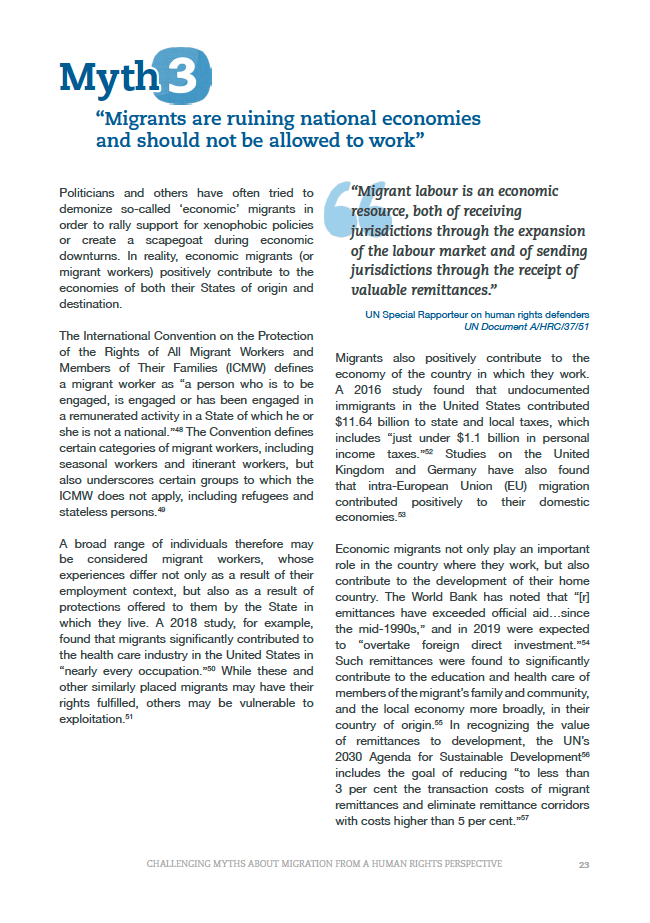“Migrants are ruining national economies and should not be allowed to work”
Politicians and others have often tried to demonize so-called ‘economic’ migrants in order to rally support for xenophobic policies or create a scapegoat during economic downturns. In reality, economic migrants (or migrant workers) positively contribute to the economies of both their States of origin and destination.
The International Convention on the Protection of the Rights of All Migrant Workers and Members of Their Families (ICMW) defines a migrant worker as “a person who is to be engaged, is engaged or has been engaged in a remunerated activity in a State of which he or she is not a national.” The Convention defines certain categories of migrant workers, including seasonal workers and itinerant workers, but also underscores certain groups to which the ICMW does not apply, including refugees and stateless persons.
A broad range of individuals therefore may be considered migrant workers, whose experiences differ not only as a result of their employment context, but also as a result of protections offered to them by the State in which they live. A 2018 study, for example, found that migrants significantly contributed to the health care industry in the United States in “nearly every occupation.” While these and other similarly placed migrants may have their rights fulfilled, others may be vulnerable to exploitation.
“Migrant labour is an economic resource, both of receiving jurisdictions through the expansion of the labour market and of sending jurisdictions through the receipt of valuable remittances.” UN Special Rapporteur on human rights defenders UN Document A/HRC/37/
Migrants also positively contribute to the economy of the country in which they work. A 2016 study found that undocumented immigrants in the United States contributed $11.64 billion to state and local taxes, which includes “just under $1.1 billion in personal income taxes.” Studies on the United Kingdom and Germany have also found that intra-European Union (EU) migration contributed positively to their domestic economies.
Economic migrants not only play an important role in the country where they work, but also contribute to the development of their home country. The World Bank has noted that “[r] emittances have exceeded official aid…since the mid-1990s,” and in 2019 were expected to “overtake foreign direct investment.” Such remittances were found to significantly contribute to the education and health care of members of the migrant’s family and community, and the local economy more broadly, in their country of origin. In recognizing the value of remittances to development, the UN’s 2030 Agenda for Sustainable Development includes the goal of reducing “to less than 3 per cent the transaction costs of migrant remittances and eliminate remittance corridors with costs higher than 5 per cent.”

La realidad desde el terreno
Protecting migrant domestic workers
FI has reported on the case of Indonesian domestic workers in Malaysia, who are an important component of the care sector in a country with an ageing population. In its joint submission for the Universal Periodic Review of Malaysia, FI and partners wrote:
“The ratio of documented and undocumented migrant workers is estimated at 50:50. Indonesian migrant workers in Malaysia have often been exploited and tortured. They have limited access to health care and other services, which lead to permanent disabilities or death. The volume of complaints received from domestic workers, as well as a series of high profile cases of abuse disclosed by the media, led Indonesia to suspend deployment of domestic workers to Malaysia in 2009 pending a revised agreement. However, in 2011 Indonesia and Malaysia resumed another MoU with some additional clausal on labor protection, including the minimum wage. This MoU ended in 2016.
[…]
On the 11 February 2018, Ms. Sau, a 21-year old Indonesian maid from NTT Province, died allegedly as a result of mistreatment by her employer in Penang in Malaysia. Before dying, she was found sitting helpless on the porch of her employer’s house in the company of a Rottweiler-style black dog tied to the rope beside her. She was rushed to Bukit Mertajam Hospital, but she passed away. The neighbors around the employer’s house told police that, for over a month, Ms. Sau was forced to sleep with a Rottweiler on her employer’s porch.
Initially, she worked legally in Malaysia until her return to Indonesia in 2014. She went back to Malaysia to work a second time without going through the formal procedure. Therefore, she was allegedly a victim of human trafficking, and working without a visa for two years which forced her to work in a deplorable condition until her death. The employer of Ms. Sau was charged of employing a foreign worker illegally and murder.”
The case of Ms. Sau is unfortunately not unique. As noted by the Special Rapporteur on the human rights of migrants, women may be particularly at risk, especially when “working in unskilled, undervalued and lower paid sectors, often as domestic workers or caregivers, […] in spaces that are difficult to regulate, such as private homes.” Such abuses are pervasive across countries. One study conducted by the Comité d’action contre la traite humaine interne et internationale (CATHII), an FI partner in Canada, found that “most cases of forced labor had to do with migrant workers who had entered Canada legally.”
Given the vulnerable situations that migrant workers, especially women, find themselves in, it is critical for host States to accept and implement relevant international human rights legal obligations and standards and take other actions that prevent the abuse of migrant workers as well as reinforce their rights. The 2030 Agenda recognizes the importance of protecting labor rights and promoting “safe and secure working environments for all workers, including migrant workers, in particular women migrants, and those in precarious employment.”
The Right to Work and the Right to an Adequate Standard of Living
State Obligations: Article 6 and Article 11 of the International Covenant on Economic, Social and Cultural Rights respectively affirm the right to work and the right to an adequate standard of living.
In regards to the right to work, the UN Committee on Economic, Social and Cultural Rights (CESCR) has affirmed:
- “The principle of non-discrimination […] should apply in relation to employment opportunities for migrant workers and their families.”65
- “States parties are under the obligation to respect the right to work by, inter alia, prohibiting forced or compulsory labour and refraining from denying or limiting equal access to decent work for all persons, especially disadvantaged and marginalized individuals and groups, including […] migrant workers.
The CESCR has also noted:
- “The right to just and favourable conditions of work is a right of everyone, without distinction of any kind. The reference to “everyone” highlights the fact that the right applies to all workers in all settings” including “workers in the informal sector, migrant workers, workers from ethnic and other minorities, domestic workers […] agricultural workers, refugee workers and unpaid workers.”67
- “Migrant workers: These workers, in particular if they are undocumented, are vulnerable to exploitation, long working hours, unfair wages and dangerous and unhealthy working environments. […] Undocumented workers often fear reprisals from employers and eventual expulsion if they seek to complain about working conditions. Laws and policies should ensure that migrant workers enjoy treatment that is no less favourable than that of national workers in relation to remuneration and conditions of work. Internal migrant workers are also vulnerable to exploitation and require legislative and other measures to ensure their right to just and favourable conditions of work;”68
The International Convention on the Protection of the Rights of All Migrant Workers and Members of Their Families has also addressed the right to work, where Article 25 affirms:
“1. Migrant workers shall enjoy treatment not less favourable than that which applies to nationals of the State of employment in respect of remuneration and:
(a) Other conditions of work, that is to say, overtime, hours of work, weekly rest, holidays with pay, safety, health, termination of the employment relationship and any other conditions of work which, according to national law and practice, are covered by these terms;
(b) Other terms of employment, that is to say, minimum age of employment, restriction on work and any other matters which, according to national law and practice, are considered a term of employment.
- It shall not be lawful to derogate in private contracts of employment from the principle of equality of treatment referred to in paragraph 1 of the present article.
- States Parties shall take all appropriate measures to ensure that migrant workers are not deprived of any rights derived from this principle by reason of any irregularity in their stay or employment. […]”
Global Compact on Migration
- Objective 6: “Facilitate fair and ethical recruitment and safeguard conditions that ensure decent work”
- Objective 18: “Invest in skills development and facilitate mutual recognition of skills, qualifications and competences”
- Objective 19: “Create conditions for migrants and diasporas to fully contribute to sustainable development in all countries”
- Objective 20: “Promote faster, safer and cheaper transfer of remittances and foster financial inclusion of migrants”

Franciscans International, the NGO of the Franciscan Family to the United Nations, has prepared this material. The publication presented in this post is an extract from the document “Breaking down the Walls, Myth 3: Migrants are ruining national economies and should not be allowed to work” you can do it here ↓


